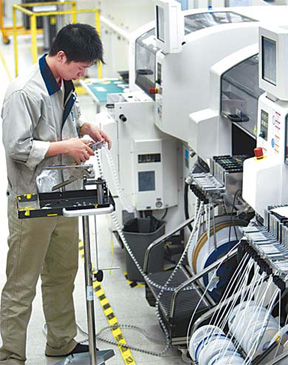News
Sophisticated infrastructure attracts foreign firms to Nanjing
By Hou Qingyang (China Daily)
Updated: 2009-09-16 15:59
 |
Large Medium Small |
While the economic slowdown has plagued many Chinese cities with contracting industrial output and an exodus of outside investors, Nanjing, the capital of Jiangsu province, stands out as an attractive venue for foreign companies.
A recent PricewaterhouseCoopers (PwC) report said Nanjing boasts all the ingredients to become a hub for advanced manufacturing and service industries.
Nanjing has established an industrial connectivity in advanced manufacturing and modern service sectors such as software outsourcing, pharmaceuticals and financial services, PwC China Director Kelvin Lee said.
"Nanjing offers a well-educated work force, and the turnover rate here is much lower than in other Chinese cities," Lee said.
|
 A worker operates production machines at Nanjing Panda Electronics Co Ltd, located in the Nanjing Hi-tech Development Zone. Nanjing has huge potential to be a hub for hi-tech, advanced manufacturing and service industries. [CFP] |
Nanjing is home to 41 universities and colleges, 113 technical schools and 501 independent research institutions.
Jung-Bae Yang, president of Nanjing LG Display/PDP Co, said an important reason to set up a factory in Nanjing is to take advantage of its convenient location and human resources.
Moreover, the comfortable living environment has added to Nanjing's attraction to foreign business leaders.
Yang said Nanjing is a friendly city, and added that his wife also loves it.
Bernhard Weber, vice president of Bosch and Siemens Home Appliances (China) Co, has been living in Nanjing for 10 years.
"My kids go to the international school here. Nanjing is a cosmopolitan city and it is very convenient for foreign families with kids," Weber said.
Since the global financial crisis, the municipal government has been concerned about cash flow and the health of local companies.
"Officials called to ask if our company needs any help, which is something that my colleagues back in Germany cann't imagine," Weber said.
The PwC survey interviewed representatives from 10 companies in different industries and collected investment environment rating sheets from 138 companies.
The survey evaluates Nanjing's investment environment by eight indicators, including location and transportation, integration with international markets and infrastructure.
The other indicators are human resources, research and development capacity, financial systems, government support and efficiency, and living environment.
"A third party like PwC will assess Nanjing's investment environment objectively and professionally for international investors," said Wang Shouwen, deputy mayor of Nanjing and a former official of the Ministry of Commerce.
Recently, many local governments, including Beijing and Shanghai, have released favorable policies such as tax refunds and rent subsidies to attract foreign investment.
In the first half of this year, actual foreign investment in China was $43 billion, down 17.9 percent from a year earlier, according to the Ministry of Commerce.











